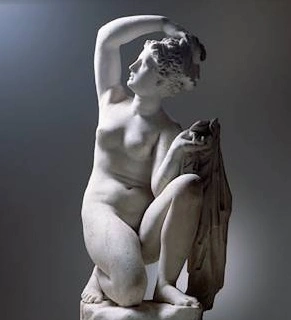Aphrodite Aphrodite, in Greek mythology, the goddess of love and beauty and the counterpart of the Roman goddess Venus.
Publié le 12/05/2013
Extrait du document

Aphrodite Aphrodite, in Greek mythology, the goddess of love and beauty and the counterpart of the Roman goddess Venus. In Homeric legend she is said to be the daughter of Zeus and Dione, one of Zeus's consorts, but in the Theogony of Hesiod she is described as having sprung from the foam of the sea, and etymologically her name may mean "foam-risen." According to Homer, Aphrodite is the wife of Hephaestus, the lame and ugly god of fire. Her lovers include Ares, god of war, who in later mythology was represented as her husband. She was the rival of Persephone, queen of the underworld, for the love of the beautiful Greek youth Adonis. Perhaps the most famous legend about Aphrodite concerns the cause of the Trojan War. Eris, the personification of discord--the only goddess not invited to the wedding of King Peleus and the sea nymph Thetis--resentfully tossed into the banquet hall a golden apple on which were inscribed the words "for the fairest." When Zeus refused to judge between Hera, Athena, and Aphrodite, the three goddesses who claimed the apple, they asked Paris, prince of Troy, to make the award. Each goddess offered Paris a bribe: Hera, that he would be a powerful ruler; Athena, that he would achieve great military fame; and Aphrodite, that he should have the fairest woman in the world. Paris declared Aphrodite the fairest and chose as his prize Helen of Troy, the wife of the Greek king Menelaus. Paris's abduction of Helen led to the Trojan War. Probably of Near Eastern origin, Aphrodite was identified in early Greek religious belief with the Phoenician goddess Astarte and was known under a variety of cult titles, including Aphrodite Urania, queen of the heavens, and Aphrodite Pandemos, goddess of the whole people. Microsoft ® Encarta ® 2009. © 1993-2008 Microsoft Corporation. All rights reserved.
Liens utiles
- pantheon Greek and Roman In mythology, pantheon refers to all the gods of a people, particularly those considered to be the most prominent or most powerful.
- Poseidon Greek Sea god and one of the Olympian gods; son of Cronus and Rhea; brother of Zeus, Hades, Demeter, Hera, and Hestia; husband The Roman goddess Pomona displays her fruits of plenty in the painting by French artist Nicholas Fouche (1653-1733).
- Psyche (Soul) Greek A mortal woman so beautiful that the goddess Aphrodite was jealous of her and ordered Eros to punish her.
- Dioscuri (Sons of Zeus) Greek A title used in Greek and Roman mythology for the twin brothers Castor and Polydeuces, whose Roman name was Pollux.
- Libertas Roman The personification of liberty, considered by some a goddess who protected the freedom and liberty of Roman citizens, even from despots and dictators, and who granted liberty to freed slaves.































